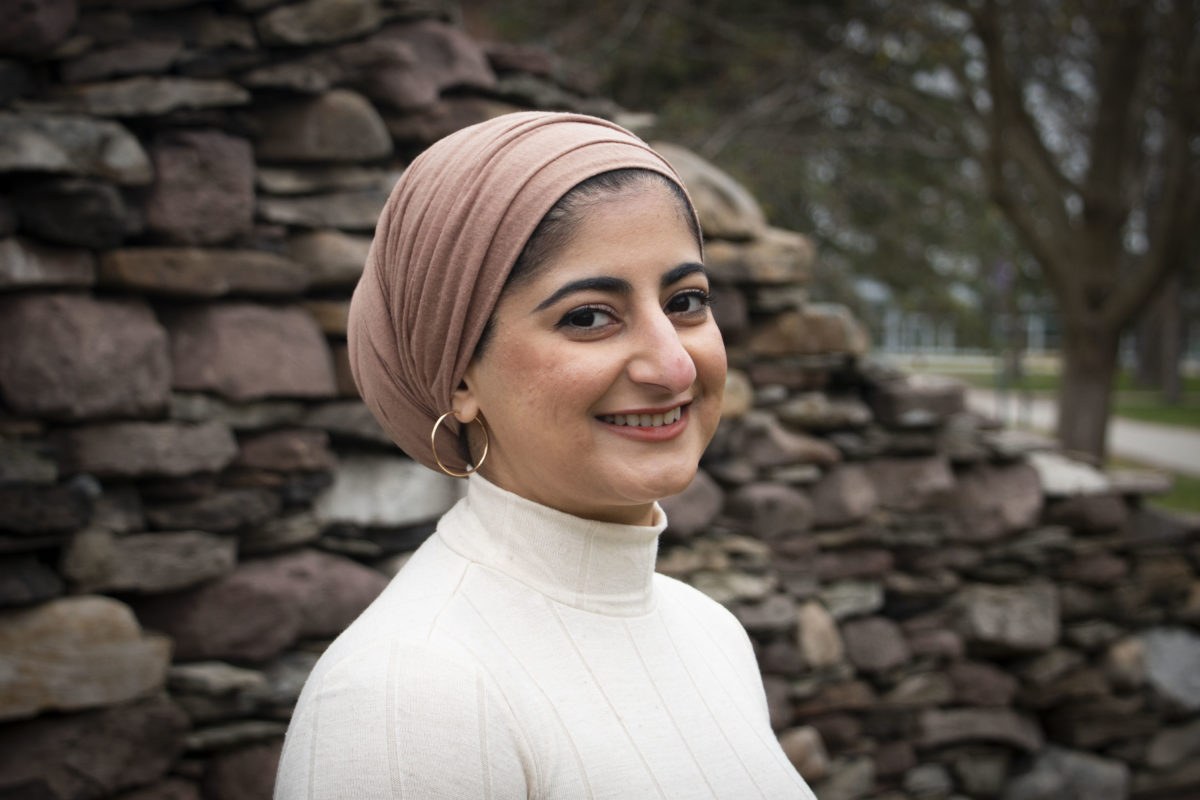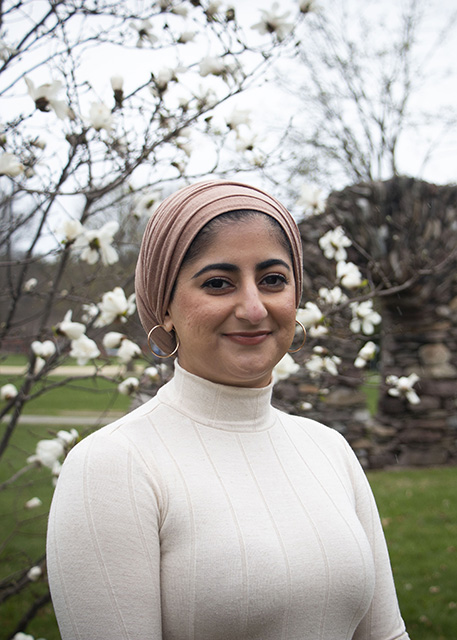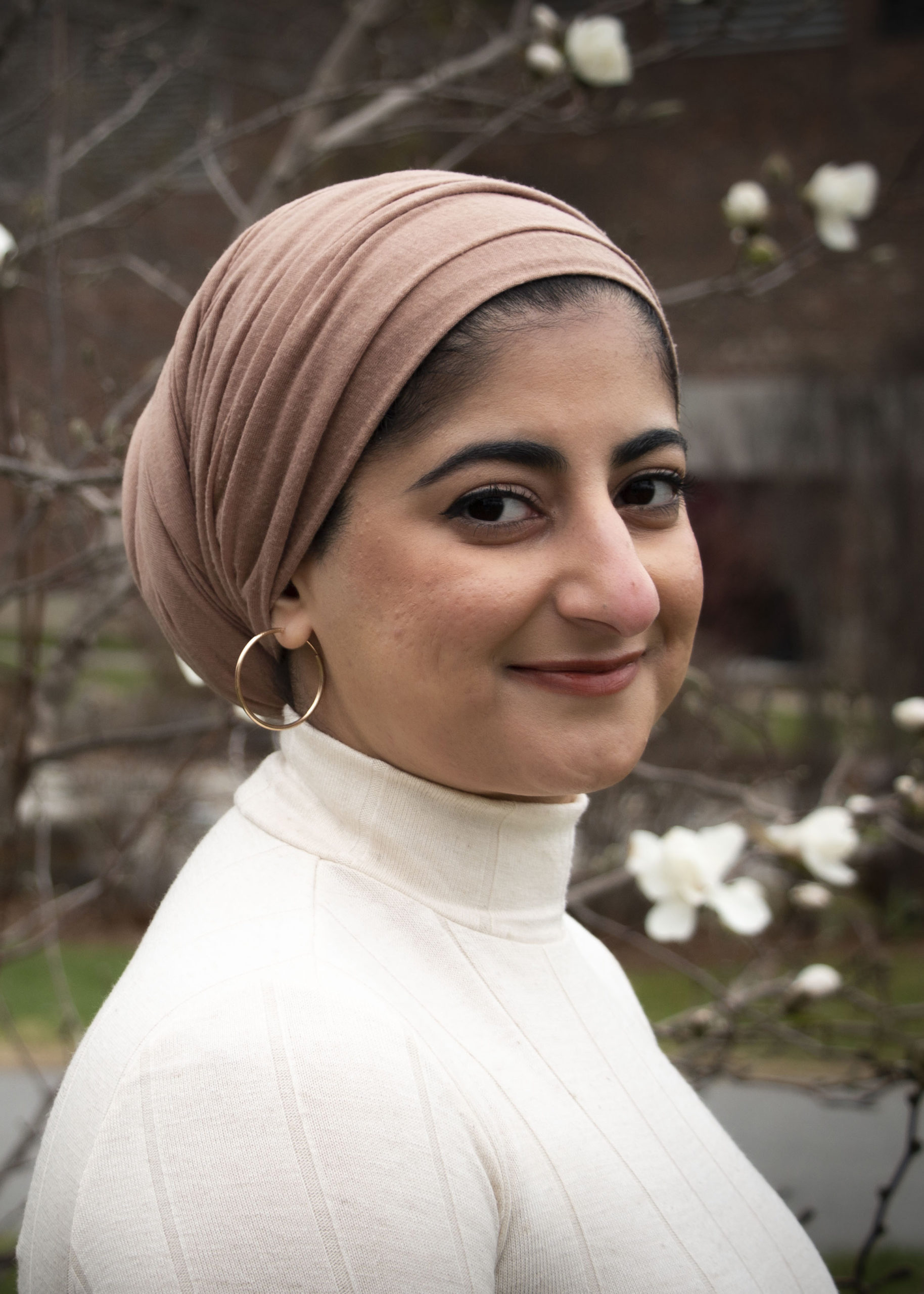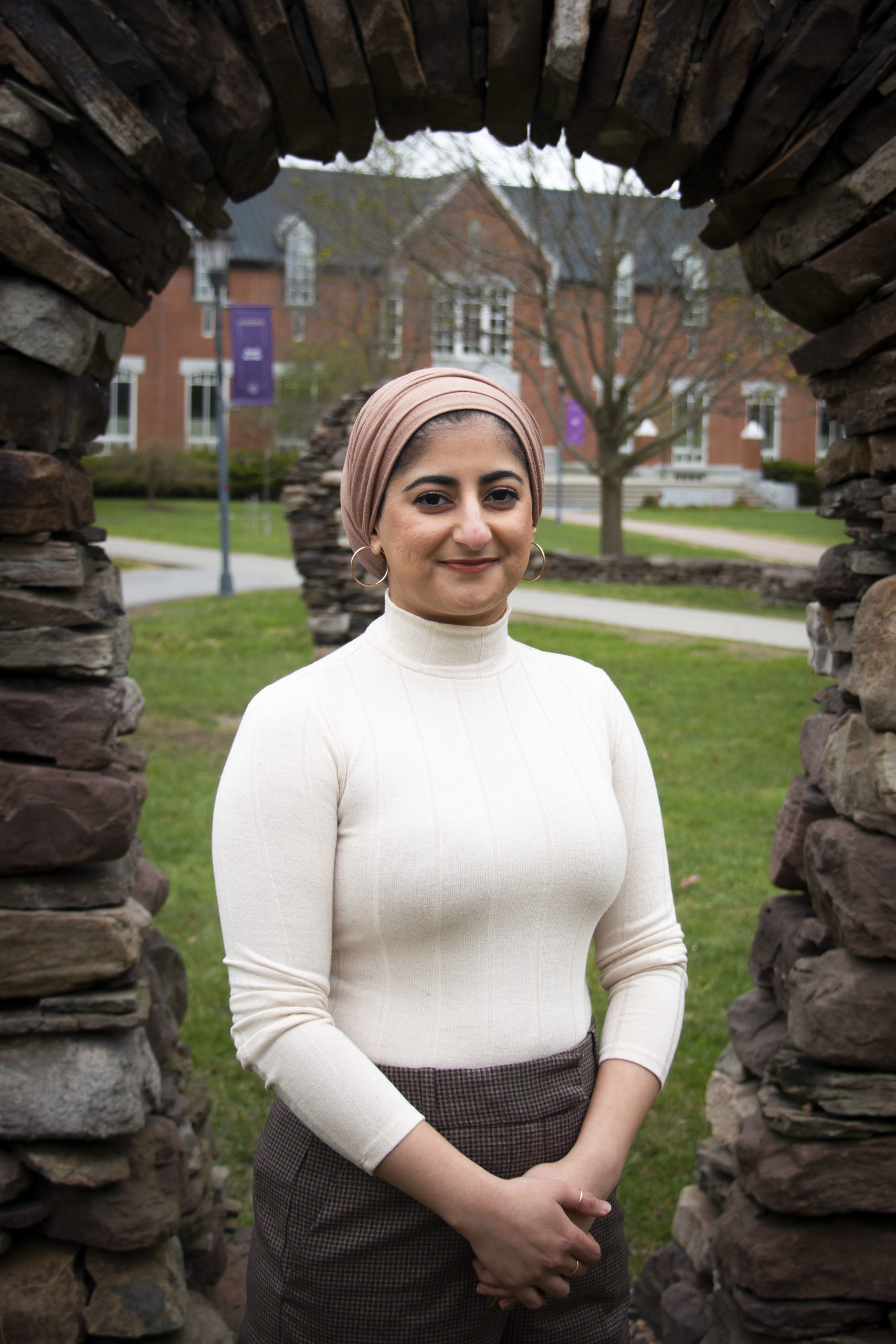
Photo by Isabella Paredes
Isabella Paredes | Social Media and Voices Editor | aparedesmend@mail.smcvt.edu
Last fall, Inaash Islam joined St. Michael’s as an assistant professor of Sociology. This semester, she will complete her first academic year teaching for the College. “I love my department, I love my colleagues, and I love my students. I feel very welcomed, and find St. Michael’s to be a great affirming space,” she said.
Growing up between Pakistan and the United States, Islam’s interest in sociology stemmed from her own experiences as a Muslim woman. “Research stems from personal experiences… There is value and richness in that. We should not downplay the value of our personal experiences to create knowledge in the world,” she said.
Islam arrived in Baton Rouge, Lousiana when she was two years old. Her dad was completing a doctoral degree in Political Science at Louisiana State University, and she experienced living in the American south until she turned seven, when her family moved back to Pakistan. In Pakistan, Islam completed most of her elementary education, middle school, and high school.
This is where the flame for sociology sparked.
During high school, Islam developed an interested in psychology, and then got exposed to sociology. Fascinated with sociological theory and how it can be applied to understand the complexities of family, society, and religion, Islam decided to go back to the United States to complete her B.A. in Sociology, at the University of Louisiana at Lafayette.
As an undergraduate student, Islam explored the Muslim-American identity. Growing up between Pakistan and the United States made Islam discover the “split-self” many Muslim-Americans experience. “Muslim-Americans tend to experience this split in our identities that makes us feel we will never fully belong to either place,” Islam said. For Islam, growing up between two countries made her question and explore her identity, how she navigates in society, and how she is percieved. When growing in the South, she would be the subject of stares and questions as a visible Muslim woman. “That is where my research took off,” she said.
After graduating from University of Louisiana at Lafayette, Islam pursued her master’s degree in Sociology at Virginia Tech. Islam wrote her master’s thesis on the Muslim-American identity, focusing on Muslim women. “I explored how Muslim-American women understand and perform their identity, and how they navigate Islamophobia by mobilizing their identity.” Islam earned her doctoral degree in May of 2021, before coming to Vermont for the first time.
After going to college and growing up in the south, Islam wanted to expand her experience and move up north. “Burlington really caught my eye, the whole vibe of the place made me want to come here,” she said. Islam also liked the aspect of community in small liberal arts colleges such as St. Michael’s. She said she finds value in working closely with students, being able to have great conversations with students from a variety of backgrounds, and being a resource of support to students. When she saw the posting for St. Michael’s, she saw it as an opportunity to get this experience.
“St. Mike’s seemed like a great place, and I am really glad I came here,” she said. Islam finds Burlington completely different from Lousiana and Virginia. “When you are a visible Muslim woman in the south, you feel like everyone’s eyes are on you. Now that I am here, I do not feel it as much,” she said.
In her research, Islam also focuses on Muslim female influencers and the role of social media in the identity of Muslim women. This interest in social media stemmed from her experience as an undergraduate student. “During my undergraduate, I arrived to the United States and was struggling to find my community and ways to interact with Americans who have never interacted with a muslim person before,” she said.
After realizing her conversations with others were strained, she noticed that the way she wore the hijab influenced how non-muslim Americans interacted with her, and conveyed particular meanings. “I started following a British Muslim female influencer. She wore the hijab as I do now, and she inspired me to adopt the hijab in this way. This also got me more into modest fashion,” she said. Islam noticed that by getting into modest fashion, she had the power to challenge the ways media portray Muslim women, changing the narrative of Muslim women being shy, meek, and oppressed. Through modest fashion, Islam found empowerment. “I contradicted these ideas with how I dressed, how I carried myself, and how I interacted with other people. That’s where I saw the effect that social media on Muslim women,” she said.



Islam started wondering if other Muslim women shared this experience, and that is where her interest for the connection between the Muslim female idenity and social media started. “I started looking at Muslim female influencers, social media, modest fashion, meanings of the hijab, and these being enformed by contexts of post 9/11 and Islamophobia,” she said. In her doctoral research , Islam explored these topics, and how Muslim women navigate life in the United States as visibly Muslim women.
Despite teaching at St. Michael’s for only one academic year, Islam is greatly appreciated by her students. “She is one of the best, if not the best, professors and educators I have had in my entire life,” said Kaltuma Ibrahim ’25. Ibrahim is a Sociology major, and has taken two classes with Islam. “As a professor, she finds the perfect balance of making you feel comfortable in the classroom and having a professional learning environment. As a person, she is so gentle, yet firm, easy to talk to, and always open to answering questions and having conversations, even if it has nothing to do with the lecture that day,” Ibrahim said.
As Black woman, Ibrahim says Islam has helped her understand her identity. “I feel like we truly downplay the importance of having people of color as educators, or in positions of authority at all,” Ibrahim said. “She makes me want to show up to class each day because I know I will learn something that will make me look at the world just a little differently each time. I have endless respect for her, her thoughts, and opinions,” she said.
Islam finds it an honor to be a source of support for BIPOC (Black, Indigineous, and people of color) students at St. Michael’s. “A lot of my students have not had a professor of color, so it is an honor to be the first one. It’s an opportunity for me to show different parts of myself, to be a resource for BIPOC students,” she said.
“My students learn from me, and I learn from my students,” she said.
Islam loves teaching her Race & Ethnic Relations class (SO-221-A), which provides space for conversations about race, ethnicity, identities, and different lived experiences. “Coming from a professor of color, who herself has experienced life as a person of color, there is that sense of connection,” Islam said. “I am able to convey the theory and put it into practice, and help students from a variety of backgrounds to see the nuances of people’s experiences,” she said.
Islam has also established strong relationships within her department. When Sociology & Anthropology professor Adrie Kusserow met her, she was struck by her passion for her research, her relatability and warmth. Kusserow describes her as a positive, centered, open minded and down to earth person, someone who is very bright and articulate. “She is gracious and accommodating and very much a team player, and flexible in terms of teaching the classes that the department needs to be taught,” Kusserow said. “I have been struck by and appreciate Inaash’s positive and enthusiastic attitude toward learning about the department, contributing in any way she can to help her colleagues, and offering to do her share of the work it takes to be a member of this department,” she said.
Islam describes the sociology department as small, but tightly knit. “I feel very lucky to be part of such a great department, my chair is amazing, my colleagues are great, they are very welcoming and supportive,” Islam said. She finds her colleagues as personally and professionally supportive. “I am transitioning from being a graduate student to a faculty member, and my colleagues are helping me transition. I am very grateful to be part of this department,” she said.
Assistant Professor of Sociology Candas Pinar first met Islam over Zoom last winter, since they were not conducting any in-person interviews. “What really struck me is how strongly her personality and warmth came across, even just through the computer,” Pinar said. “If she could communicate her humanity and warmth over a digital platform, I could only imagine how dynamic she would be in person, and that is how it turned out to be,” she said.
Pinar added that Islam is bringing a global perspective to the sociology department. “She has the ability to teach sociology in a global context, and contributed to the vision we have as a college looking outward, towards our global community,” she said. Pinar highlighted the impact Islam is having on students. “Every advisee I have that has taken a class with her has raved about that class, and to me, that is a really good sign,” she said.
As an international scholar, Islam shared a piece of advice for St. Michael’s international students. Islam believes that finding people that one can connect with can ease the adaptation process international students face when coming to the United States. “I found that as a Pakistani in the United States, having friends who belong to the same culture as you softens the homesickness that we tend to experience as international people,” she said. “Share your experiences with one another, and find solutions. Do not feel like you are alone, because you aren’t. Many others experience the same process you are experiencing,” she said. Islam also highlighted the importance of taking advantage of resources on campus.
“Having a connection with your own people allows you not to start from scratch. You don’t have to explain yourself and your experiences and identity to others. There is already that sense of establishment and connection, and that is why social support helps with adjustment,” Islam said.
Islam also shared a message with the St. Michael’s community. “People need to keep reaching out to each other, and beyond class. It is important to have conversations, whether they are difficult or easy, and find ways to embody the sense of community,” she said.
In the close future, Islam aims to become a strong source of support for students, and contribute to the community as much as she can. “I wanna work with students to make sure their voices are heard, especially regarding racial issues on campus and beyond campus,” she said. Islam also wants to work closely with CMAS (Center for Multicultural Affairs And Services), connect with different departments, students, and contribute in contribute in a variety of areas.
“I want to become an overall good community member,” Islam said.

